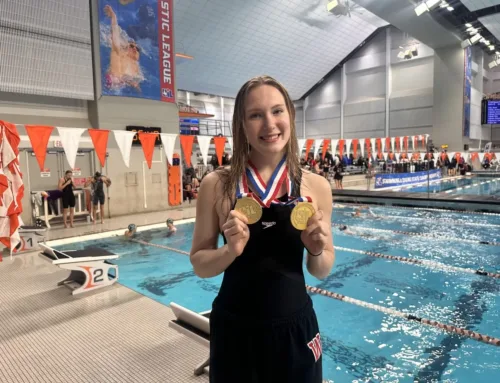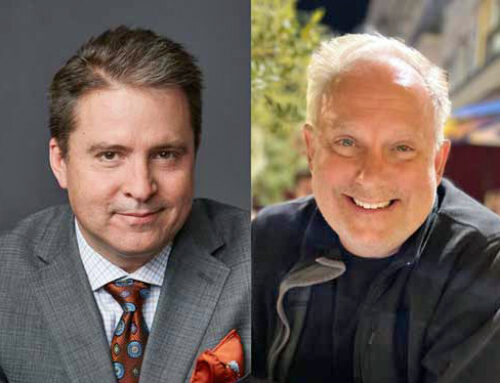Ms. Monday leaned over the sixth-grader’s shoulder, softly explaining again and again that he was smart enough to earn A’s in junior high, not the B’s and C’s he was taking home.
This wasn’t the first time Ms. Monday had encouraged the student, who even at this early age was beginning to earn a reputation as someone who didn’t care about learning.
In fact, the sixth-grader was even beginning to question his own ability.
But this time, as Ms. Monday whispered her encouragement, Mike Coston finally believed in Ms. Monday, and in himself.
And this time, he began to learn. “She helped me see that I was worth a lot more than I thought I was,” Coston says.
More than 35 years later, Coston recalls that moment as if it happened yesterday. Ms. Monday started Coston on the road to accomplishment and education, and it’s a road he has come to enjoy.
With bachelor’s and master’s degrees under his belt, and work in progress on a doctorate, Coston serves as president of the Northeast Dallas Chamber of Commerce.
But he points to a single day in sixth-grade as one of his most memorable.
“She gave me the confidence to know that I can go and do anything I wanted to do,” Coston says.
Learning From The Best
Good teachers are the foundation of our society, the people who steer our children away from the streets and into college and the workplace.
We give them custody of society’s young minds, and we charge them with molding tomorrow’s leaders.
And more often than not, despite notoriously low pay and difficult working conditions, our teachers succeed in pointing young minds and spirits in the right direction.
“I kind of think some of my teachers knew they had an impact on my life because I went back and saw them,” says neighborhood firefighter Lorenzo Beachum.
“But I never told them how much of an impact they made on my life.”
This month’s profile of three outstanding neighborhood teachers tells that story.
Demanding Perfection
For 20 years, Sharon Morgan has taught mathematics at J.L. Long Middle School.
Over the course of those two decades, Morgan has had opportunities to leave the school for what some may consider the “greener pastures” of private school.
But each time, Morgan stayed put.
“Kids in public school deserve a good education, so I’ve resisted offers from private schools,” Morgan says.
“This community has shown a commitment to this school. It has shown a willingness for us to teach their kids when other options exist, so I do feel a commitment to them.
“The fact that parents in this community are willing to send their kids here, I feel like I have a responsibility to them.”
Over the years, Morgan’s students have consistently been among the City’s highest mathematical achievers – among both public and private school students – at the middle school and high school levels.
Two of Morgan’s former students, Caroline Chlore and Erin Armstrong, both recent graduates of Woodrow Wilson, recently achieved perfect scores on the math portion of the SAT last year.
“She (Morgan) was always there to help you and answer every question,” Chlore says.
“We learned different tricks and how to do neat stuff without using a calculator.”
Morgan says she tries to relate math to real-world applications, which she believes helps her students comprehend better.
“I generally care about kids, and that’s a starting point,” Morgan says.
“I want my kids to have a tangible experience with math every chance they get. There is a meaning for mathematics in the real world.
“I don’t allow a child to say: I can’t do it. If I’m teaching you something in algebra I know you’ll see on the SAT, I’ll point it out to you. The main thing is to just get a child to realize they are capable of doing math.”
Morgan’s classroom demeanor is praised by parents as well.
“She (Morgan) is one of the finest math teacher’s in Dallas,” says Nancy Cunningham, who has had two children go through Morgan’s classes.
“She’s really dedicated to her kids. (Long and Woodrow) are very teacher-oriented. The threat of losing teachers like her changes whether parents want to send their children to those schools.”
Morgan says she recently decided to remain at J.L. Long until 2002, at which time she plans to retire.
“One constant through all my years of teaching is the time my husband allows me to devote to teaching,” Morgan says.
“At some point in my life, my husband deserves some more of my time.”
But just considering retirement causes Morgan’s eyes to redden as a lonely tear crawls down her face.
“The biggest compliment they (my students) pay me is when they try to figure out whether their younger brother or sister wil be here before I leave,” Morgan says.
“There’s nothing more precious a parent gives to a school than their child.”
“Thanks to all the parents who have let me teach their kids. That’s what keeps me going.”
A Scientific Theory
“I hated science,” says Cathleen Morobel Garcia.
“But we (Mount Auburn Elementary) needed a science teacher, and one of the part-time teachers didn’t want to take the position.
“The principal basically came in and said: You’re the new science teacher.”
“Now I love it.”
Garcia is not only a science teacher now – she’s one of the City’s best, recently being honored as teacher of the year by the Rotary Club of Dallas.
“I truly didn’t expect to win,” says Garcia, who will become the fourth-grade science teacher at the new Eduardo Mata Elementary this year as Mt. Auburn becomes a K-3 school.
“I’m very proud other people see the value in the way I do things.”
The Texas A&M graduate approaches her job unconventionally. Case in point: Garcia believed she couldn’t teach the merits of recycling and environmental protection to inner-city kids who have never experienced nature or seen the ecosystem at work.
So she took them camping.
“I’ve always felt like kids learn at a variety of different levels,” Garcia says.
“You tell the kids to recycle, but they can’t understand because they live in the city. Then you show them beauty.”
Garcia admits the first camping trip wasn’t easy, but the kids had fun learning.
“We didn’t go to sleep,” Garcia says. “They loved the campfire and canoeing.”
Aside from her duties teaching science, Garcia initiated several philanthropic projects (lakeshore cleanups and can drives, for example) that help teach the value of community service to a student body in which 90 percent of students receive free lunches.
“It’s a whole lot easier working with these kids,” Garcia says.
“Anything you offer is wonderful to them. It’s not hard to impress them. It’s a lot less of a challenge than working with kids who get everything they want.”
Like all good teachers, Garcia finds herself drawn to a classroom full of someone else’s kids.
“No two days are alike,” Garcia says. “I would never be able to work in a job where you do the same things every day.”
“I like working with kids. They’re funny, chatty, fresh and irritating.”
“To be such a positive influence on kids is very rewarding, and one of the reasons I work so hard is because I have the chance to reach kids.”
Citizen of the World
Jenny Carroll considers herself a “citizen of the world.”
Having lived in India and Australia before moving to America 18 years ago gives merit to Carroll’s claims.
A psychology and English teacher at Bishop Lynch High School, Carroll recently received the Catholic school’s Arete Award for teaching excellence.
“It’s probably the award that means the most to me because your peers choose you,” says Carroll, who has been at Bishop Lynch for 17 years, the past nine as a full-time teacher.
Carroll believes it’s important to share her international experience with students to increase their awareness of foreign cultures. The school’s annual Ethnic Week, which she helped re-establish last year, is one of her pet projects.
For one week during the school year, students and faculty celebrate cultural diversity with costumes, cuisine, entertainment and guest speakers. Each day is devoted to a different culture.
“I try to convince my students that this (Dallas) is not it. It is not the entire world,” Carroll says. “It gives the kids a different perspective on life.”
Carroll came to Dallas in 1979 and taught at Bishop Dunne Catholic High School for a year before taking a job as assistant librarian at Bishop Lynch. Carroll spent eight years as a part-time teacher and assistant librarian before becoming a full-time teacher at the school.
Heather Nease, a Bishop Lynch senior, says she enjoyed Carroll’s psychology class as a junior.
“At first, I didn’t want to take it (psychology), but she made me really enjoy it,” Nease says.
“She always uses examples when she teaches. It’s not just one continuous lecture.”
Carroll, who says she eventually wants to live on a beach one day, will continue teaching “until it’s not fun anymore.”
“To me, school should be fun, and I have a lot of fun here,” Carroll says.





